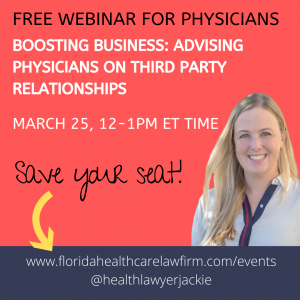By: Jacqueline Bain
 As many healthcare businesses invest in their websites, two areas that are often added as a quick afterthought (or overlooked completely) are the Terms of Use and Privacy Policy. But a potential slip up in these areas can cost you dearly.
As many healthcare businesses invest in their websites, two areas that are often added as a quick afterthought (or overlooked completely) are the Terms of Use and Privacy Policy. But a potential slip up in these areas can cost you dearly.
Terms of Use
This section is a contract between you and the users of your website regarding what they can expect from the website and how they will act while on the website. You can use this section to protect you and your business from a variety of potential disasters including (but not limited to): limitless liability and intellectual property infringement.
You can use this section to limit any liability that you might create by having a website. For instance, if you give some medical advice (i.e., “Lowering your cholesterol reduces your risk for a heart attack.”), you can use your Terms and Conditions to limit a user’s reliance on that advice without additional medical intervention (“We are not your treating physician—if you have questions about your cholesterol levels, contact your physician.”).
You can also use this section to inform your users about any intellectual property protections that you might have. If your technology or services have pending or protected status, you’ll need to make your users aware of this information.
Finally, this section should establish the laws under which your website agrees to be governed. Even if the internet knows no boundaries, your website should establish its own. If your business is located in Florida, you can choose to be bound by Florida and Federal laws. It could limit any potential exposure in other states or nations.
Privacy Policy
This section is required by law to inform your website users what kind of data you will collect and how you will use it. A well-crafted Privacy Policy helps you avoid liability under a complex array of state and federal laws dealing with users’ private information.
The Children’s Online Privacy Protection Act (COPPA) protects minors under the age of 13 from having personal information collected without parental consent. How can a website operator be expected to know whether a user is 13 or under? If you plan on collecting any information from your uses, your Terms and Conditions should have a section prohibiting anyone under age 13 from accessing and using your site. It’s a simple fix that can potentially save you huge penalties.
What information will you collect? Does your website use cookies? Will you share any data with outside sources? If yes, your privacy policy is where you tell that to your users!
In healthcare, a website’s Privacy Policy is hugely important. With laws like HIPAA and its state counter parts, including the Florida Information Protection Act, healthcare providers are held to a higher privacy standard than almost any other industry. Take the time to work with your legal advisors to ensure that your privacy policy is tailored to your business and contains language consistent with what you are actually doing to safeguard information.
 By: Steven Boyne
By: Steven Boyne


 By:
By: 
 By:
By: 
 Florida Healthcare Law Firm is offering advisement by way of
Florida Healthcare Law Firm is offering advisement by way of 
 By:
By: 
 By:
By: 
 The Florida Healthcare Law Firm is hosting a free webinar for physicians on appropriate third party relationships. With shrinking
The Florida Healthcare Law Firm is hosting a free webinar for physicians on appropriate third party relationships. With shrinking 


 As many healthcare businesses invest in their websites, two areas that are often added as a quick afterthought (or overlooked completely) are the Terms of Use and Privacy Policy. But
As many healthcare businesses invest in their websites, two areas that are often added as a quick afterthought (or overlooked completely) are the Terms of Use and Privacy Policy. But  Has your attorney ever told you to do your best to comply with certain safe harbors to the Federal
Has your attorney ever told you to do your best to comply with certain safe harbors to the Federal